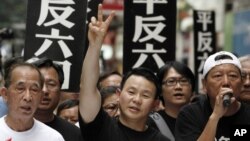A return trip home is a common experience for many immigrants. But for a group of former Chinese student protest leaders, it can be a very rare opportunity to visit family after more than 20 years abroad.
A former student leader of China's Tiananmen Square protests is now appealing to President Xi Jinping for permission to come home to visit his dying mother, who may only have days left.
Xiong Yan has come a long way since that 1989 protest movement, for which he was detained 19 months. In 1992, he fled to the United States, where he studied theology and became a U.S. Army chaplain.
For now, though, his mind is focused on China.
“Her head doctor called me and said my mom’s situation is not optimistic. Maybe she only has 10 days left," he told VOA.
He said he applied for a visa but was rejected by the Chinese consulate in Houston, Texas. In response, he wrote an open letter to Xi and Premier Li Keqiang.
Xiong wrote that Beijing should allow him to come back because, culturally, China regards respect for one's parents and elders as an important attribute, and his visit would have no relationship with politics.
“I really want to see my mom during her last few days," he said. "I want to touch her hands and to comb her hair. Last night, I found an old picture of my mom hugging me [when I was 100 days old]. I felt very heartbroken."
China's government has not publicly commented on Xiong's open letter to Xi.
Most of the former leaders of the Tiananmen Square protests have not been able to travel back to their homeland. An exception was Wu Renhua, a former lecturer at China University of Political Science and Law, who was also exiled to the United States because of the June 4, 1989 incident. He was able to go back to China to visit his mother in 2012, but was turned away when he tried to visit a second time.
Wu told VOA he thought that if the student leaders wanted to go back to China, most would have to get another country’s passport under a new name before applying for a visa.
Xiong’s said that in the future, he planned to retire from the Army and run for the U.S. House of Representatives. But right now, his mind is on his past and one hoped-for final visit with his mother.
This report was produced in collaboration with the VOA Mandarin service.











